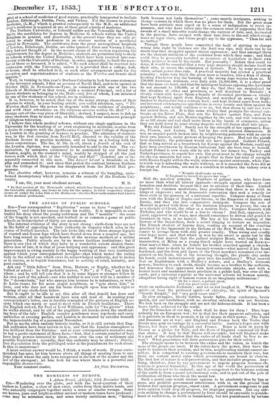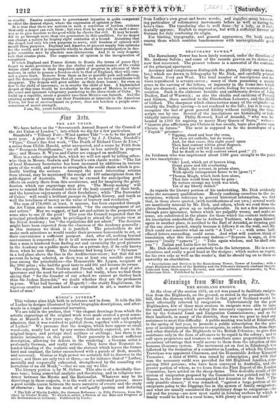THE HOMELESS OF EHROPE.
1 Adam Street, Adelphi, 12th December 1853. Sin—Wandering over the globe, and with the head-quarters of their leaders in London, a class of men exist, exiles from their native lands, and who naturally congregate together under a sense of similar wrongs. Some are heroes, pure and bright as either ancient or modern times have produoed ; some may be mistaken. men, and some merely ambitious men, "bating lords because not lords themselves " ; some merely intriguers, seeking to change systems in which there was no place for them. But the great mass have been patriotic men urged on by a sense of indignation to resist op- pression, and who have fallen into the common error of supposing that the swords of a small minority could change the current of rule, and, decimated in the process, have escaped with their bare lives to the soil which recog- nizes no legal slave, and whose people say to the oppressor, " Thus far and no farther."
Though these people have committed the fault of striving to change wrong into right by violence ere the fruit was ripe, still there can be no doubt that they struggled against unjust oppression; and that amongst them are the choicest intellects of the countries from which they come ; and that could they be peaceably installed as members of legislature in their own lands, progress would be the result. But peaceably Before that could be done, it would be essential that a very largo majority should declare itself on their side, to secure the submission of factions. Now, by some process or other, actual power does rule. A practical majority has ejected a practical minority ; while very likely the great mass is inactive, like a flock of sheep, heading whichever way the barking of the strong dogs worries them to. If 150,000 Austrians dominate over Italy with 24,000,000, it is a clear proof that the mass are inert, and that the intelligent Italians opposing the Austrians do not amount to 150,000, or if they do, that they are neutralized by the rivalries of cities and provinces, so well described by Niebuhr ; a rivalry which still keeps Spain a bundle of disunited provineea—a rivalry that kept Scotland apart from England, and marched an army of High- landers to Derbyshire but a century back ; and kept Ireland apart from both; and invented contemptuous appellations in every county and shire against its neighbours ; and would continue as to do, but that steam by rail and wave has united them all. It is this same rivalry that prompts the eternal out- breaks on the River Plate, that sets the Ecuador against Peru, and Peru against Bolivia, and sets Mexico together by the ears, and will continue to do so till steam and rail shall unite them in the bonds of commerce, unless they are held down by some strong despotic will till fusion shall take place. , Why did Poland fall ? Surely not by the strength of her oppressors, Rus- sia, Prussia, and Austria. No, but by her own internal dissensions. It was an unquiet parish broken into by neighbouring policemen with an eye to their own interest, under pretext of keeping the peace. Had not the parish been disorderly, the policemen would not have appeared. Gallant Poland, that so long served as a breastwork for Europe against the Moslem, could not have been overthrown by Russian barbarians had she been true to herself. Gallant Poland is now ready side by side with her former foe, Turkey and Turkish provinces, to regain her own. But great must be the change wrought ere she can maintain her own. A people that in their last trial of strength with Russia fought within the walls, democrats against aristocrats, while Pas- kewitch was bombarding the walls without, as it is recorded the Jews did at the siege of Jerusalem, are not in a condition to achieve the victory over a foreign foe.
" Nought shall make us rue, If England to herself do prove but true."
Still the question remains. Numbers of gallant men, who have done no more than what all history applauds—struggle against oppression—are homeless and destitute because they are in advance of their time. Linked together by common misfortune, they proclaim that there is no faith in kings or emperors ; and in democratic convention they seek a remedy for these evils in the panacea of a universal republic. Compare many of these men with the Kings of Naples and Greece, or the Emperors of Austria and Russia, and they rise into comparative demigods. Compare the seta of Mazzini in power with those of the Austrian Emperor in powe,r, the one is as a disciple of Christ, the other as a modern Nero. Compare Kossuth with Nicholas, and who would be at a loss to choose ? And that, oppressed, in- jured, aggrieved in all ways, men should sometimes be driven and goaded to tyrannize in turn, is no marvel. The boy at his lessons, reading of the horrors of the Inquisition, feels a secret longing to torture an inquisitor. The French student of bygone days reading an account of the cruelties practised by the Spaniards on the Indians of the New World, became a bne- cancer to avenge them with still greater cruelty. Thus wrong and cruelty ever beget more, and that which is won by the sword is again lost by the sword. What marvel that the gallant sculptor Monti, who fought in the insurrection at Milan as a young Greek might have warred on Xerxes— what marvel that, when he beheld his brother crucified against a church- door, and done to death by slow bayonet-wounds--what marvel if his heart hardened, and the form and figure of the Croat murderer remained ever im- printed on his brain, till at the recurring thought, the plastic clay under his hands could instantaneously grow into his semblance ? What marvel that an Englishman with a Shelley's nature, and a Shelley's dormant powers, listening to such deeds, should become as a brother to the sufferers, and denounce their oppressors with half-articulate shrieks, and with a heated heart and maddened brain proclaim in a public hall, war over all the earth, and a universal republic as the universal solvent for human misery, altogether losing sight of human reason in an imaginary millennium ?
" Oh for a steed, a gallant steed, And any good cause atal,"
wrote an enthusiastic Irishman ; and let us not laugh at it. What was the spirit—at least the professed spirit—of chivalry, the spirit of Spensees "Gentle Knight," but "any good cause atal ?" By slow struggles bloody battles, heady tights, deep conference, brave speech, did our forefathers, with no cheering onlookers, win our freedom. We look back on the struggle and see not the hideous details. It has been a brave battle, achieved for the world.
But the homeless of our day, what shall be done for them ? They hope ardently for an European war ; for in that lies their apparent salvation, and
it is patriotic in them to promote it by all means in their power. The Turks and Russians are at war; and England and France back the Turks, that Russia may gain no vantage by a successful battle. Austria's hopes side with Russia, her fears with England and France. Rome is held in pawn by France as a pledge for Italy, and the fleets of England command all Rus- sian shores. It may be that Russia will succumb; but will England make it a part of the stipulation that the exiles of all lands shall be free to re- turn ? What guarantees will their persecutors give for their safety ?
The struggle seems to be between the exiles and the rulers, in which the mass of the people are inert. If the rulers have the power, they have the right to maintain their position, and in this, neighbouring nations cannot in- terfere. It is competent to existing governments to maintain their rule, but there arc certain moral rules which governments are bound to observe. The first law of nature is self-preservation, and that includes progress. An therefore, done by any government to impede progress becomes ob- noxious to general humanity. In this age of the world the persecution of the Galileos is not to be endured ; and it is competent to the humane nations of the earth to form a moral international code, and to put out of the pale of civilization all those who break the moral law.
Such a moral code would declare opinion to be absolutely (roe by lips or press, and prohibit government interference with it, on the ground that without free opinion progressaannot exist. A government competeut to put down opinion could stop all progress, for improper purposes. But any sub- jects seeking to change a government by force should be amenable to punish- ment or restriction, as death or banishment, but not punishment by tortune or cruelty. Passive resistance to government injustice is quite competent to effect the desired object, where the expression of opinion is free. It is true that there are nations in such a condition of lawless violence that only a despot can rule them ; but even then be may rule in such a man- ner as to give freedom to the good while he checks the evil. It may beneed- ful to go through more than one generation in this condition' for no despot can change a nation by leaping eight centuries at a bound. Assuming that the despot had only his own purposes to serve, still freedom of opinion will mould these purposes. England and America at present supply free opinions for the world, and it is impossible wholly to check their promulgation in des- potic countries save by absolute non-intercourse. And it is only despotic rule that creates plots. The suppression of opinion is the inauguration of conspiracy. If when England and France dictate to Russia tho terms of peace they forget to make provision for the due shelter and maintenance of' the exiles whose chief crime is their impulsive spirit of progress in advance of their nations, in order to possess a freedom akin to that of England, they will com- mit a grave fault. Remove from them as far as possible pain and suffering, and the democratic dogmatism that all races of mett are born republicans will disappear. The despots will grow milder as their fears lessen ; for even as fear is the child of ignorance, so is cruelty the child of fear. A highminded despot at this time would be invaluable to the people of Mexico, to replace the cruel and ignorant voluptuary pandering to the slave-trade of Cuba. To build up a republic' needs a grander race than Mexico can furnish. And the existing system of turning out their Presidents at intervals in the American Union, for fear of encroachment on power, does not betoken a people over- conscious of moral strength.



































 Previous page
Previous page